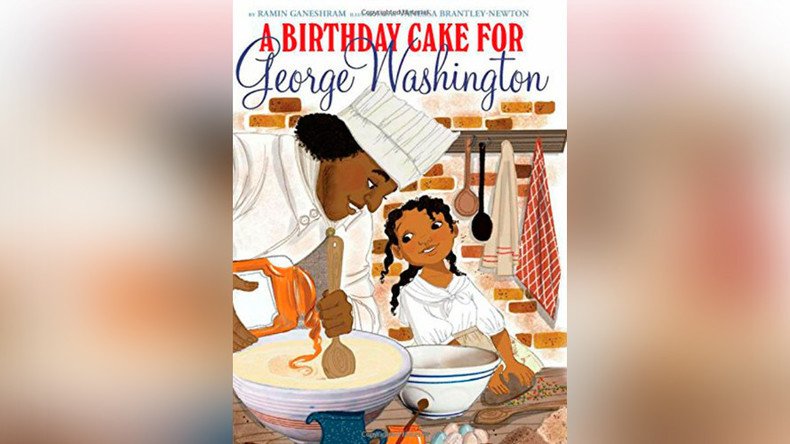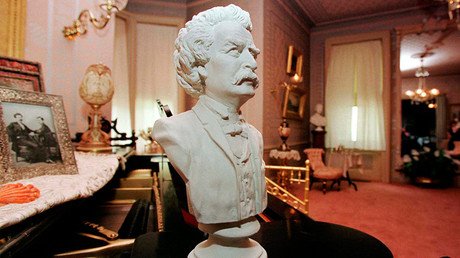'False impression of reality': Publisher pulls book about George Washington's 'happy' slaves

The Scholastic Corporation has halted the distribution of a new children's book that critics say depicts slaves of the first US president George Washington as cheerful and accepting of their bondage without any context on the nature of slavery in the US.
The book, A Birthday Cake for George Washington, is based on actual slaves owned by George Washington; the main character, Hercules, was Washington's chef. The narrative follows Hercules, described as a valued, respected slave to Washington, employing his daughter and narrator of the book, Delia, and other slaves in the process of making a birthday cake for their master. When Washington lauds the cake at the end of the book, Hercules responds, "an honor and a privilege, sir," according to the School Library Journal.
The book, with its vibrant illustrations, has garnered backlash for its depiction of slaves as wholly joyful despite being owned by the one of the most powerful men in the United States at the time.
Scholastic Pulls Children’s Book Featuring Washington’s Slave in Philly https://t.co/ePbENSQfHqpic.twitter.com/APvSzqWJus
— Philly Mag (@phillymag) January 18, 2016"[W]ithout more historical background on the evils of slavery than this book for younger children can provide, the book may give a false impression of the reality of the lives of slaves and therefore should be withdrawn," Scholastic said in a statement.
"We do not believe this title meets the standards of appropriate presentation of information to younger children, despite the positive intentions and beliefs of the author, editor, and illustrator," the publisher added.
Here is a refresher for those who have a penchant for revisionist history. George Washington, Slave Catcher https://t.co/7rckKkGN89
— Ekemini Uwan (@sista_theology) January 15, 2016The book's author is Ramin Ganeshram, "a noted culinary scholar, an expert in the field of Washingtonian history," as described by Scholastic's executive editor, Andrea Davis Pinkney. Earlier this month, Davis Pinkney praised the book for "contextualizing Hercules and Delia as enslaved people, while at the same time accurately depicting Hercules as the notable figure he was."
"Ramin notes that George Washington understood that it was evil to own fellow human beings, and that he was very conflicted about his part in the wicked institution known as slavery," Davis Pinkney wrote in announcing the book's release. "Slavery’s injustice is also cited on the book’s front flap, so that any parent or teacher will know that this is an aspect of the story, and that it is to be addressed."
‘Blackface’ backfire - the pics that sparked a hate-storm https://t.co/pEgmsPwFqHpic.twitter.com/OYlHDTJQdy
— RT (@RT_com) January 7, 2016Others have not echoed that appreciation. In a review of the book, the School Library Journal wrote that the narrative is "a troubling depiction of American slavery."
"Young readers without sufficient background knowledge about the larger context of American slavery may come away with a dangerously rosy impression of the relationship between slaves and slave owners, and those with a deeper understanding are likely to find this depiction offensive," the SLJ review said.
I'm officially calling for an end to "happy slave" children's books. First "A Fine Dessert" and now this George Washington book? Come. On.
— Carolyn Edgar (@carolynedgar) January 14, 2016During one scene in the book, SLJ wrote that "Hercules, Delia, and the other slaves are seen in the kitchen below, smiling with glee as they work on the cake, evoking a strangely cheerful and exuberant scene reminiscent of a Disney film."
Ganeshram, the book's author, said in a recent commentary that the book does not whitewash slavery's horrors, but does acknowledge "that enslaved people who received 'status' positions were proud of these positions," which led illustrator Vanessa Brantley-Newton "to depict those in A Birthday Cake For George Washington as happy and prideful people."
Solely focusing on "the narrative of constant-cruelty" involved in slavery risks "erasing those, like Chef Hercules, who were remarkable, talented, and resourceful enough to use any and every skill to their own advantage," she wrote.
"In our modern society, we abhor holding two competing truths in our minds," she said. "It is simply too hard. How could one person enslave another and at the same time respect him? It’s difficult to fathom, but the fact remains it was true. We owe it to ourselves—and those who went before—to try and understand this confusing and uncomfortable truth."
She added that much of traditional children's literature has often depicted slaves as "childlike, foolish, or happily insensible of their condition," and that those "old tropes" should not be replaced with new ones.
'Happy slave' in new book about George Washington, escaped Mt Vernon in 1797 https://t.co/AxLt5cGOpE h/ @zellieimanipic.twitter.com/ghOLgTagF1
— Mark Elliott (@markmobility) January 16, 2016An appendage to the book notes that Hercules eventually escaped Washington, but that his children, including Delia, were enslaved by the Washingtons their entire lives, according to SLJ.
"The somber facts recounted in small print at the end of the author’s note are unfortunately not reflected in either the text or the illustrations of the story that precedes them," the SLJ review said.














